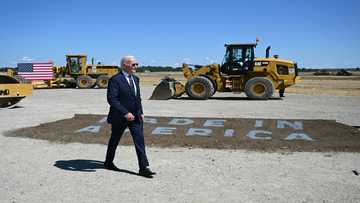Thai Supreme Court dismisses final Toyota appeal over tax bill

Source: AFP
New feature: Check out news exactly for YOU ➡️ find “Recommended for you” block and enjoy!
Thailand's Supreme Court on Thursday dismissed a final appeal by the local subsidiary of car giant Toyota over a disputed $270 million import tax bill following a decade of legal wrangling.
The case relates to Toyota Motor Thailand's importation of parts for its Prius model at a reduced tax rate between 2010 and 2012 under a Japan-Thailand trade agreement.
Thai authorities said Toyota's imports were not included under that agreement and estimate the company owes roughly 10 billion baht ($270 million).
While the country's Central Tax Court ruled in favour of Toyota in 2017, the decision was later overturned.
On Thursday the Supreme court issued a final ruling against Toyota, stating the firm was not eligible for the 30 percent import duty reduction.
In a statement Toyota Motor Thailand said it "respects the Supreme Court's ruling".
PAY ATTENTION: Follow us on Instagram - get the most important news directly in your favourite app!
But it noted that a 2012 customs ruling -- later upheld by the Supreme Court -- reinterpreted previously agreed import rules, "resulting in a much higher tax on TMT".
"Once TMT has obtained the Supreme Court's full, written decision, we will study the ruling and comply with its requirements," the statement said.
"We are committed to ensuring that our business practices comply with all applicable government regulations," the firm added.
The dispute centres on whether the imports should be classified as car parts or fully assembled cars.
The 10 billion baht is comprised of import duty, value-added tax, excise tax, and municipal tax, explained customs department senior official Chaiyut Khumkhun.
"We have yet to see the exact amount Toyota has to pay because we are waiting for the full document of the ruling," he said.
United States officials are also examining allegations that consultants hired by Toyota Motor Thailand may have attempted to bribe officials over the tax dispute.
In April 2020, Toyota reported possible anti-bribery violations related to its Thai subsidiary to the US Securities and Exchange Commission and the US Department of Justice.
Those two bodies oversee America's Foreign Corrupt Practices Act -- a law that aims to stop businesses from bribing public officials in foreign countries.
The company said it is cooperating with the investigations.
"The investigations could result in the imposition of civil or criminal penalties, fines or other sanctions, or litigation by the DOJ or the SEC," the company said in a filing made public in March last year.
"Toyota cannot predict the scope, duration or outcome of the matter at this time."
The firm has operated in Thailand since 1962 and runs three plants employing 13,500 people.
It manufactures about 760,000 vehicles in the Southeast Asian country annually.
New feature: Check out news exactly for YOU ➡️ find "Recommended for you" block and enjoy!
Source: AFP



